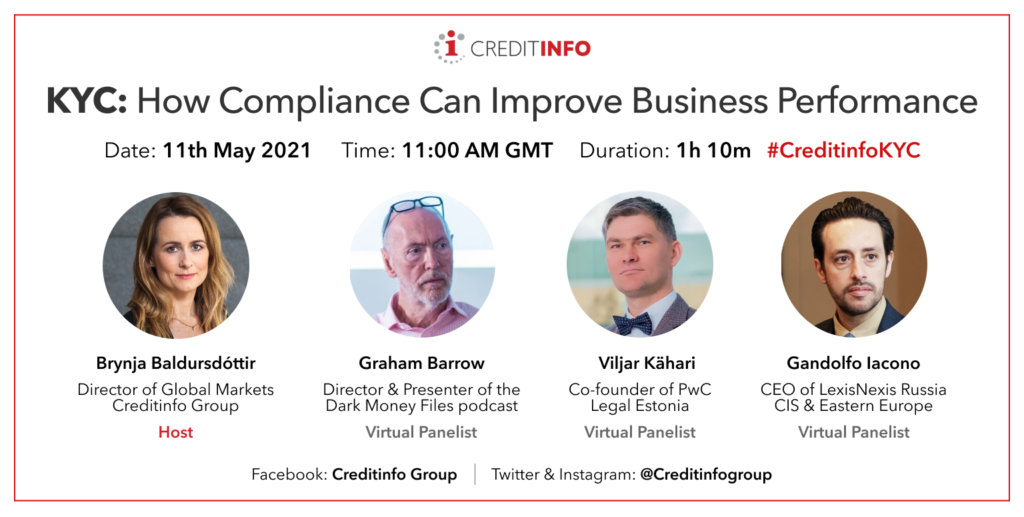Creditinfo Estonia’s sanctions’ monitoring solution for small businesses

With the ongoing aggression initiated by the Russian Federation in Ukraine, the need to implement international sanctions has to be embedded in the daily business activities of our companies.
We know that companies – operating in the fields of activity subject to such a special obligation – must do more due diligence to mitigate the risks associated with implementing sanctions, but the processes should be somewhat similar to all of the companies operating in Estonia.
Such companies, whose daily economic activities do not deal with continuous customer background research or transaction monitoring, can sometimes be in a difficult situation where they do not have enough know-how or manpower resources to assess the risk of whether one of their customers or partners falls under the established restrictions or not.
Finding such a necessary workforce is always possible, but as you know, making such a fixed cost can sometimes be impossible according to the company’s business model. In this case, one of the options is to delegate the control of said risks outside the company or to use convenient and straightforward, but at the same time reliable services to help with this task, which are available on the market.
For these cases, Creditinfo is offering small businesses the opportunity to mitigate their risks in two ways – by delegating the checking of compliance with sanction lists for their customers and partners entirely to us or by using a straightforward and convenient solution on our e-Krediidiinfo portal – WebScreening.
The web-based service WebScreening allows you to request the entry of a person of interest to you through a convenient and comprehensive user interface, both on international sanctions (European Union and the United Nations) and watch lists (so-called local sanctions and “black lists” of various countries, in some instances, for example, wanted persons) as well as persons with a national background ( PEP) from the lists.
With additional functions, it is possible to perform user management in the portal (if the company has more than one user) or view the archive of requests made. At this point, it is good to note that the archive of performed requests is convenient to use, for example, to check the performance of the employee’s duties and prove the requests made to the supervisory authority, if necessary.
Check out the service: www.creditinfo.ee/kyc
An excellent Account Information Service is based on the accuracy of the categorization of transactions

In 2021, Creditinfo Estonia received permission from the Financial Supervision Authority to start offering account information services in Estonia, which later expanded to the markets of Latvia and Lithuania. Today, we have been offering the account information service on the market for almost two years. The account information service is based on the PSD2 directive. We have access to the transaction data of customers of banks and financial institutions using a secure data transmission channel and customer consent.
Account information categorization is the first and most trivial account data processing that creates customer value. In addition to the primary value, categorization is also an input for all subsequent, significantly more value-creating services (for example, debt risk assessment). Without categorization, each time finding, analyzing and displaying value from account information becomes too resource-intensive, so the end user would have to wait a relatively long time to get a result from their data.
Unfortunately, categorization is worthless if the accuracy and quality of the categories are low. Of course, every transaction on a bank account is not an input for assessing a person’s credit risk. When determining credit risk, it is critically important that the accuracy of the categorization of transactions required for analysis is as high as possible. This is to prevent credit losses for companies and overdue debts for private individuals, directly affecting both interest groups’ reputations.
The main input from categorization is related to income
Visit creditinfo.ee/en for more information.
Ivo Vallau
Open Banking Product Manager, Ceditinfo Estonia.
The Role of Artificial Intelligence and Machine Learning in Credit Scoring

Executive Summary
The use of artificial intelligence (AI) and machine learning (ML) in credit scoring is revolutionizing the lending industry. By leveraging vast amounts of data and advanced algorithms, lenders are able to more accurately predict credit risk, improve operational efficiency, and expand access to credit for underbanked individuals and small businesses. This white paper explores the benefits and challenges of AI and ML credit scoring, and provides guidance for lenders on how to successfully integrate these technologies into their lending processes.
Introduction
Traditional credit scoring models rely on a limited set of data points, such as payment history, outstanding debt, and length of credit history, to assess creditworthiness. These models are effective for many borrowers, but they can be limiting for individuals with thin credit files or non-traditional sources of income. AI and ML credit scoring models, on the other hand, can analyze a vast array of data points, including non-traditional data sources, to develop a more accurate and comprehensive picture of a borrower’s creditworthiness.
Benefits of AI and ML Credit Scoring:
1. Improved accuracy: AI and ML algorithms can analyze a wide range of data points, including non-traditional data sources such as social media activity and utility bill payments, to develop a more accurate picture of a borrower’s creditworthiness. This can result in more accurate credit scores and better loan decisions.
2. Expanded access to credit: Traditional credit scoring models can be limiting for individuals with thin credit files or non-traditional sources of income. By analyzing a broader range of data points, AI and ML credit scoring models can expand access to credit for underbanked individuals and small businesses.
3. Increased efficiency: AI and ML credit scoring models can automate many aspects of the lending process, reducing the need for manual underwriting and improving operational efficiency. This can result in faster loan decisions and a better borrower experience.
Challenges of AI and ML Credit Scoring:
1. Data privacy and security: As AI and ML credit scoring models rely on vast amounts of data, data privacy and security are critical concerns. Lenders must ensure that they are collecting and using data in compliance with applicable laws and regulations, and that they have robust cybersecurity measures in place to protect sensitive borrower data.
2. Bias and discrimination: AI and ML algorithms are only as good as the data they are trained on, and if that data is biased, the algorithms can perpetuate that bias. Lenders must be mindful of potential biases in their data and take steps to mitigate any potential discrimination in their lending decisions.
3. Explainability: AI and ML algorithms can be complex and difficult to interpret, which can make it challenging for lenders to explain their lending decisions to borrowers. Lenders must be able to provide clear explanations of their credit scoring models and lending decisions to borrowers.
Conclusion
AI and ML credit scoring has the potential to revolutionize the lending industry, providing more accurate credit scores, expanding access to credit, and improving operational efficiency. However, lenders must be mindful of the potential challenges, including data privacy and security, bias and discrimination, and explainability, and take steps to mitigate these risks. By investing in AI and ML technologies and developing robust risk management practices, lenders can successfully integrate these technologies into their lending processes and provide better loan decisions and a better borrower experience.
Samuel White
Director of Direct Marekts, Creditinfo Group.
Creditinfo launches SME blended scorecard in Kenya

Credit information leader launches pan-African SME initiative, ahead of global rollout
LONDON, UK, 21st July 2021 – Creditinfo Group, the leading global credit information and decision analytics provider, is today announcing the launch of a scorecard solution tailored for small to medium-sized enterprises (SMEs). Through its unique approach to data and algorithms, this scorecard will help financial institutions improve their credit assessment and facilitate financing to the SME market, which has typically been less able to access finance.
Creditinfo, recognizing the importance of SME risk assessment across the world is aiming to roll out a global solution to address this challenge. The company will first launch the SME scorecard in Kenya, ahead of a wider rollout across countries in Africa, and several other key economies across the globe.
The unique modeling approach Creditinfo have developed significantly reduces, and in some cases eliminates, the human effort needed to assess customers’ risk profile based on credit data. It is delivered in a software platform which unifies, streamlines, automates and centralizes the risk evaluation process. Creditinfo’s SME scorecard is considerably stronger at predicting business failure than existing traditional models.
Burak Kilicoglu, Director of Global Markets at Creditinfo, commented, “SMEs drive innovation and push digitalization forward for many people by providing services to underserved segments of the population and creating job opportunities. SME scorecards will accelerate access to finance for the benefit of whole economic ecosystem. At Creditinfo we have access to a wealth of credit bureau data as a starting point, and so are uniquely positioned to offer this solution in global markets.”
Kamau Kunyiha, CEO of Creditinfo CRB Kenya, added, “Kenya is the most dynamic and receptive market for SME lending innovation, demonstrated by the successful adoption of mobile wallets and microloans. We look forward to seeing the economic impact of this new solution as it comes into full effect and we see more capital flowing through the SME economy.”
-ENDS-
About Creditinfo
Established in 1997 and headquartered in Reykjavík, Iceland, Creditinfo is a provider of credit information and risk management solutions worldwide. As one of the fastest-growing companies in its field, Creditinfo facilitates access to finance, through intelligent information, software and decision analytics solutions.
With more than 30 credit bureaus running today, Creditinfo has the most considerable global presence in this field of credit risk management, with a significantly greater footprint than competitors. For decades it has provided business information, risk management and credit bureau solutions to some of the largest, lenders, governments and central banks globally to increase financial inclusion and generate economic growth by allowing credit access for SMEs and individuals.
For more information, please visit www.creditinfo.com
PR contacts:
Marketing Manager/ PR for East Africa
Phidi Mwatibo
Email: Phidi.mwatibo@creditinfo.com
KYC: How compliance can improve business performance – post event summary

Know Your Customer (KYC) is not just a set of regulations to comply with. With the right data, processes, and technology, it can be a valuable tool to understand our customers better and thus be able to support them throughout their challenges, while at the same time shielding business owners from unnecessary risk. We wanted to delve a little deeper into this issue and so hosted a webinar with leading experts on the regulatory environment and financial crime to delve into the topic. Our panel of experts discussed what organizations need to do to de-risk their operations and how they can set themselves up for future success.
Our expert panel was made up of Graham Barrow, Director and Presenter of the Dark Money Files podcast, Viljar Kähari, Co-founder of PWC Legal Estonia and Gandolfo Iacono, CEO of LexisNexis Russia CIS & Eastern Europe.
Chaired by our Director of Global Markets, Brynja Baldursdóttir, the webinar drew in over 500 registrants and 300 attendees from 33 different countries, all eager to better understand the opportunities compliance technologies can bring to a business.
Brynja began the session by explaining that KYC is not just a box ticking exercise, it is a necessity for better business in 2021. The key thing to consider is that KYC is all about trust.
Dark Money
To begin, Graham contextualized the important role that KYC plays in protecting the financial system from ‘dark money’. Dark money, “which is any money that enters the financial system for which you cannot show for certain where it comes from”, has real victims that do not show up on paper. Dark money must come at a cost to somebody. Better KYC processes are not just protecting customers and businesses, it also protects taxpayers in corrupt countries and potential victims of money laundering all over the world.
Part of the issue with stopping or at least resisting the flow of dark money according to Viljar Kähari, is that “banks interpret KYC requirements very differently. It seems that client onboarding and monitoring processes are sometimes much more important than actually understanding a client’s business and monitoring transactions.” This alludes to what Graham believes the larger problem to be, that, “there really is a big difference between banks being compliant in terms of the anti-financial crime requirements, and stopping dirty money entering the system.”
Understand your customer
To shift from just being compliant with regulations to stopping financial crime with compliance we must progress from Knowing Your Customer to ‘Understanding Your Customer’ (UYC), a phrase Graham coined during the discussion. He commented that this is “because if people are intent on laundering money, they will provide beautiful documentation to get into the financial institution, but that documentation will need to be lies.” If we can go beyond knowing our customer to understanding them, then we can see through even the best lies. “Because if you force people and criminals to lie when they create the accounts documentation, you then have good documentation to monitor the downstream transactions. And that is the control. It is getting them to say in detail what they want you to hear and then monitor in detail what they actually do. It’s the difference between those two things, which is your control.”
Data, data, data
Our panelists agreed that the bridge between KYC and ‘UYC’ is data. Graham commented that “the ability to take KYC data, and feed it into your transaction monitoring system intelligently, is probably the single most important thing we can do. But we must sell one idea to all our customers. The idea that KYC is not an ordeal we have to put the customer through. It is the most important thing we can do to protect them.”
There are barriers that compliance teams need to break through to get to this next level of KYC. Gandolfo says, “the issue is that we see compliance or AML as a cost centre”. Compliance departments need to be seen as an asset hat needs serious data and software,” and many managers are not aware of this. Managers need to see the value that effective compliance brings in potential fines avoided. Viljar concurred, “compliance departments are overloaded. They do not have the resources they need; they do not have access to different databases.”
Perception
The perception of compliance needs to change for organizations to allocate the resources teams need to resist the flow of ‘dark money’. Viljar stated that “changing the mindset of compliance officers from an inspector to a business advisor is more important and necessary today. Because we cannot assume that all clients are criminals unless they can prove otherwise. It is the common understanding now because you need to provide a massive amount of information and documentation to show that you are getting your money legally. And that is why I’m thinking that the compliance function must become more proactive at finding practical solutions rather than just saying ‘that this work cannot be done.’”
To make this organizational culture shift it will take time, but our panel agreed that a realistic alternative is to outsource KYC and AML, provided there is not a “homogenization of risk appetite”. Viljar noted that when a company does not have access to a public register, “there are several service providers who can easily help to solve this problem. Just the banks and other regulated financial institutions must trust service providers and user services.”
Change of mindset
Summarizing the event Brynja rounded up the discussion by pointing out that the most important takeaway from the webinar is that as an industry, we need to start changing our mindset from knowing our customer, to understanding our customer. We need to vastly improve international cooperation in terms of legislation and regulation, and we can refine processes around KYC in terms of increasing shared services, using data and technology in a smarter manner which ultimately should make sure that we as businesses make our processes reflect our appetite for risk. It is time to make the switch from simply knowing, to understanding our customers.
Learn more
This virtual event was a huge success from our perspective which gathered an incredibly engaged audience. Thank you so much for all your brilliant questions – our panel enjoyed the lively debate!
If you would like to re-watch the session, or if you were unable to attend, please use this link to learn about the benefits KYC compliance can bring to your business.
Can KYC Bring Opportunity For Business Growth?

For many, due diligence checks and Know Your Customer (KYC) processes are simply seen as compliance requirements imposed by regulators that can add friction and cost to their business, but that is a flawed assessment. In fact, KYC has many advantages for business and can act as the differentiator needed for your business to survive and thrive in the increasingly digital, global economy.
In a market full of uncertainty, true understanding is a valuable commodity. Today, many organizations have been forced to re-evaluate what they need to do to ensure not just their longevity, but their continued success. Knowing the pressures that customers and prospects face, being able to support them through their challenges and shield your own business from unnecessary risk is key.
However, there are still too many treating KYC compliance like a tick box exercise, and not the competitive point of difference it can be.
The potential and possibilities that arise from a well-conceived and resourced compliance organization is remarkable. Whether it’s through the use of better data, fusing local data with global intelligence, or understanding the emerging threats from organized, financial criminal groups and working to counter them, good compliance can help businesses avoid the most damaging risks and seize the most lucrative opportunities.
At Creditinfo, we’ve long understood this. Our customers know that the combination of our decision analytics technology and access to a wide range of traditional and alternative data provides them with the tools they need to better understand their customers and take the appropriate steps to capitalize on the opportunities on their doorstep.
These opportunities are only ever going to increase, and those that become complacent on compliance, will begin to fall behind.
Tomorrow, on May 11th, we are hosting a webinar with leading experts on the regulatory environment and financial crime to delve into just this. Our panel of experts will discuss what organizations need to do to de-risk their operations and how they can set themselves up for future success.
This virtual panel will include speakers from PwC, Lexis Nexis, and The Dark Money Files, and will cover compliance technology, regulatory trends, and the ever-evolving threat landscape, to help you understand what you need to do to protect your organization from financial crime, and the opportunities better KYC processes can bring to your business.
To hear more about the benefits better KYC compliance could create for your business, register your attendance today.
You can also follow along on Twitter with the hashtag #CreditinfoKYC.
How Creditinfo supports Fintechs

The COVID-19 crisis had a profound financial and social impact across the globe, with several different industry sectors impacted. Curfews limited the effective utilization of physical branches, forcing financial services firms to turn to online channels. Few organizations were ready to make the transition to ‘digital lending’ smoothly, but this is where the Fintechs excelled. Capitalizing on their technical competencies, agility, and focus on specific niches they triggered substantial advances in online lending – ranging from streamlined, friction free customer experience to KYC processes.
Instead of focusing on internal operational efficiencies like traditional banks, Fintechs driving digital lending started to construct an ecosystem of services that evolved around their customers. Regulators, who have been observing the significant growth of digital lending started to weigh in; either requiring compliance with existing regulations or developing new regulations to be met. These steps had a wide-ranging impact from data quality to having a prudent credit risk management framework, including analytics, risk management tools, policy and procedures.
Creditinfo is well positioned to support Fintechs, helping them remain focused on providing an outstanding customer digital lending experiences, while ensuring a proven credit risk management framework. Our approach consists of 4 key services:
- Data: the first step to perform a credit risk assessment is done by collecting all relevant Depending on circumstances, this can be traditional (Credit Bureau) or non-traditional (transactional) data. Data quality checks need to be performed to derive the maximum insight from it. Operating in 45 countries and providing Credit Bureau services in 23 of them, we define industry standards on data quality. We know how to combine traditional and non-traditional data to be used in decisioning that meets your risk appetite.
- Analytics: deriving insight from data is our expertise. Our highly predictive models underpin objective, prudent credit risk decisions. By combining non-traditional and traditional, we are able to improve predictive power by over 50%.
- Decisioning: implement your scorecards with ease in our decisioning system. Streamline and eliminate manual processes to ensure quick and consistent decisions to your customers, providing you a competitive edge.
- Business know-how: we know how to adapt global best practices within your local environment. We are ready to discuss with you how we have improved lending for one of our customers by over 20% or reduced non-performing loans by 15%.
Please get in touch with us to discuss how we can make a positive step change in your business.
Creditinfo granted AISP license, launches intermediary service

On Monday, April 5th, the Financial Supervision Authority issued AS CREDITINFO EESTI with an account information service provider (AISP) license. This license allows the company – which has a strong history of more than 25 years mediating credit and business data – to act as an intermediary between institutions, providing read-only access to bank account information in order to enable the delivery of mutually beneficial services to account holders.
Creditinfo now has the ability to provide bank account owners in Estonia with access to new, enhanced services from authorized companies, such as those providing loans or payment-by-installment options, by sharing information from their account statement.
This sharing of balance and transaction data takes place in an automated form that makes the process of applying for credit or payment-by-installment significantly easier and faster for both the owner of the account and the service provider.
“We are always looking for opportunities to expand our business and better serve our customers in order to remain the most reliable, strong and innovative business partner to both individuals and companies in this fast-evolving field,“ Ege Metsandi, CEO of Creditinfo Estonia explained. “The whole area of assessing creditworthiness and solvency is moving toward automation, so credit decisions can be made as quickly and reliably as possible. The greatest added value here can be created by combining high quality data and the best technological solutions. Creditinfo with its long history and international network is leading the way in both of these areas. With this new AISP license, we can be an even better partner to our customers by helping to further de-risk lending and provide better access to appropriate financing for their specific needs“ Metsandi added.
Law firm WALLESS advised Creditinfo throughout the application process for the AISP license.
AS Creditinfo Eesti is the largest company providing business information and risk management services in Estonia. First founded in 1993, the company has been an affiliate of Creditinfo Group since 2016.
Additional information:
Ege Metsandi
CEO and board member of Creditinfo Estonia , Email: ege.metsandi@creditinfo.ee
Tel: (+372) 5078172
Creditinfo’s new KYC tool allows affordable background checks of international business partners

Creditinfo is the first company in Estonia to bring the shared KYC utility “Know Your Client” to the market. The tool gathers the data an entrepreneur needs to know about clients and business partners from both Estonia and international reliable databases covering the whole world.
According to the rules of the fight against money-laundering and financing of terrorism, each company is responsible for ensuring that every business transaction and cooperation agreement complies with the terms stated in the anti-money laundering law (the Anti-Money Laundering and Countering the Financing of Terrorism Act). In essence, it is the duty of a company to know their clients and business partners in case of both single transactions and longer business relationships.
“Every entrepreneur needs to check the background of the business partner because when the transaction reaches the bank, it may already be too late. The accounts may be frozen and you could end up losing the money,“ Jaanus Leemets, head of Creditinfo’s product development unit explained. “One questionable transaction, no matter how great or small sums are involved, may significantly increase the overall risk rating of the entrepreneur.”
The background checks of companies and individuals operating in Estonia has been a widely available service for years, but checking the background of international partners has been a great challenge for small and medium-sized companies. Access to reliable international databases is very expensive, and the offered solutions are often not suitable for checking single transactions or compiling detailed reports of the parties involved.
“Banks spend millions of euros a year on anti-money laundering background checks, leaving entrepreneurs stranded since they have no resources to afford these services. The results of public search portals are also often not reliable, extensive nor up-to-date enough in their content, especially with international companies, as well as also domestic inquiries. We therefore created a tool that makes inquiries from dozens of different reliable, international databases. The new tool is affordable to small businesses as well and it is also simple to use for single inquiries.“ Leemets added.
To get the entrepreneurs started, Creditinfo offers consultations on the correct implementation of the background check and its proficiency. There is also the option of joining the KYC business school in order to understand the essence of KYC regulations, the precise duties, everyday needs of their companies, and all available options to regularly check the background of clients and business partners without spending too much time.
Media contact:
Rain Resmeldt Uusen
Marketing Manager, Creditinfo Estonia
Email: rain@creditinfo.ee
Better information for customer due diligence in Iceland

According to the International Standards on Combating Money Laundering and the Financing of Terrorism and Profileration, Financial institutions are required to conduct due diligence on their customers. They have a special obligation to verify customer information. Financial institutions need to examine in detail the relationship between individuals and companies and whether the individuals in question are politically exposed.
The process of obtaining this information can be complex and time consuming, but with the help of Creditinfo it is possible to significantly ease the process so that employees can focus on more demanding tasks. Creditinfo in Iceland have a number of solutions available that can assist financial institutions with due diligence:
Company registration information
According to the guidelines from the Icelandic government against money laundering and terrorist financing, it must be verified that the individuals acting on behalf of a company are specifically authorized to act on its behalf. Using Creditinfo, it is possible to get a detailed overview of the managers of the company, its purpose, registered capital and information about board members.
Beneficial Owners
When conducting due diligence, financial institutions need to investigate the beneficial ownership of their customers. It is common for individuals to own companies through other companies. Such relationships can be complex and it can be difficult to find out exactly who the individual owners are and their individual stake at the company in question. Creditinfo can assist in obtaining detailed information about the individuals who actually own companies and how large their share is. The beneficial ownership report also contains information from the register of limited companies. Now there is also information about the beneficial owners according to the Icelandic Revenue and Customs office in the Beneficial owners report.
Monitoring
It is not sufficient to examine customer information only at the start of a business relationship. It is equally important to maintain regular monitoring of customers and their relationships. With the help of Creditinfo it is possible to monitor changes that take place in information about specific companies, e.g. submission of new annual reports, changes in the company’s board of directors or changes in ownership. Such information is necessary to keep a close eye on your customers. Now it is possible to monitor changes in beneficial owners who own more than 25% of the company in question.
Politically Exposed Persons (PEP) – Coming Soon!
Creditinfo has begun preparing a database that will include information on Politically Exposed Persons (PEPs) to assist companies in meeting anti-money laundering requirements. In processing the information, Creditinfo consults with the Data Protection Authority in accordance with the provisions of the Data Protection Act. Individuals who will be registered in the database will have good access to the information and will be notified of its processing.
Find out about the subscription options available at Creditinfo Iceland. Visit www.creditinfo.is for more information about our solutions and services.
This article was originally posted in Icelandic on the Creditinfo Iceland blog.




